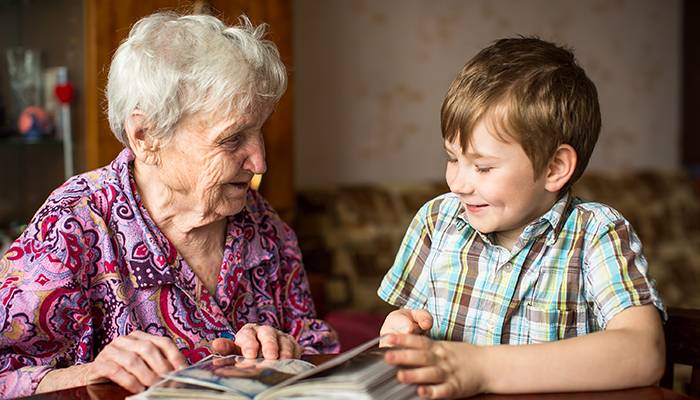Dementia and small children

The grandparent–grandchild relationship can be precious, like no other. But even young children notice if Grandma or Grandpa isn’t acting the way they used to, or the same way others do. And they will have questions. “Why does he keep calling me by Dad’s name?” “She just asked that question five minutes ago!”
Respond to them honestly. Keep it simple and age appropriate. Children under age two may feel scared. Reassure them. “Grandpa has a boo-boo on his brain that made that happen. He still loves you.” For those ages two to six, you might embellish: “Grandma has a sickness that’s affecting her brain and making it hard for her to think well.” School-age children (six to twelve) can understand that their grandparent has a disease that “messes up the brain, tangling all the thinking cells.”
Provide simple reassurance. All children need to know that the disease is not contagious and that their relative’s behavior is not their fault. You may need to remind them often.
Validate feelings. Your child may be upset by the unusual behaviors. They may sense your distress or be jealous of your attention. Let them know that sometimes you too are worried, even frustrated or angry. Give them the opportunity to share their feelings. Talk about healthy ways to cope. Check with a librarian for a helpful children’s book. If you notice acting-out behaviors or withdrawal from usual activities, consider professional help.
Suggest realistic activities both will enjoy. Maybe listening to music or singing. Planting flowers or weeding a garden. Doing arts and crafts. Taking a walk or sitting outside to enjoy nature. Looking at photo albums. Having a picnic. Storytelling. Holding hands.
Never put a child in charge to “babysit.” That is far more responsibility than they can handle. It’s not safe for them, nor for the person you care for.
Are children confused by Grandpa or Grandma?
Especially if they were old enough to develop a relationship before the dementia became apparent, children can be profoundly affected by the changes they witness. As the New York City experts in family caregiving, we at Alighieri Care Management highly recommend you address the situation candidly, especially if the person with dementia is a regular part of the childrens’ lives or affects household routines. Want help? Give us a call at 212.799.2575.
![Alighieri Care Management [logo]](https://www.alighiericaremanagement.com/wp-content/uploads/2025/04/alighieri_livewell_HORIZ_logo.png)
